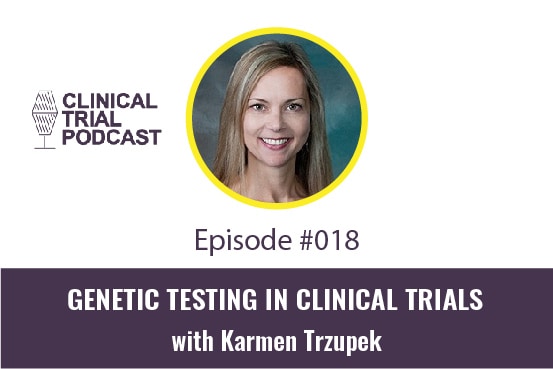Karmen Trzupek, MS, CGC, is part of the leadership team at InformedDNA where she is responsible for ocular and rare disease genetics services.
In this phenomenal interview, Karmen shares with us the world of genetic testing and the role it plays in clinical trials.
Karmen is a certified genetic counselor since 2005. She earned her masters in Genetic Counseling from Northwestern University and a bachelor’s in Microbiology from University of Illinois.
Prior to joining Informed DNA, Karmen was a genetic counselor and research assistant at Oregon Health & Sciences University.
She has been a board member at the Hear See Hope Foundation and Usher Syndrome Coalition. Karmen is also a member of the National Society of Genetic Counselors, member and author of “NSGC Telegenetics Practice Guidelines” Working Group, member of the Association for Research in Vision and Ophthalmology, member and author of American Academy of Ophthalmology Clinical Working Group to develop “Recommendations for the Clinical Assessment of Patients with Inherited Retinal Diseases.”
Her work has been published in GeneReviews; Current Opinion in Ophthalmology; Investigative Ophthalmology and Visual Science; Ophthalmic Genetics; Archives of Ophthalmology; and Ophthalmology Clinics of North America.
Please join me in welcoming Karmen on the Clinical Trial Podcast.
Resources and organizations mentioned in this episode:
Clinical Laboratory Improvement Amendments (CLIA)
Drug Information Association (DIA)
American College of Medical Genetics (ACMG)
The Long Run – TimmermanReport.com
The Forever Fix: Gene Therapy and the Boy Who Saved It by Ricki Lewis
The Gene: An Intimate History by Siddhartha Mukherjee
Topics discussed with Karmen:
- Evolution of genetic testing from one gene at a time to multiple genes at the same time
- Genetic testing in rare diseases such as inherited retinal diseases
- Cost of genetic testing
- Panel testing where multiple genes are tested at the same time
- How genetic tests are regulated
- Clinical trials in genetic testing and the benefits of genetic testing
- Role of a genetic counselor and how they work with patients, sponsors, patient foundations, and medical providers
- Recruitment challenges for sponsors for finding patients with rare diseases
- Use of telemedicine to expand access for patients
- Difference between genome and exome (whole) sequencing
- When is whole genome/ whole exome sequencing clinically relevant/necessary
- Our biggest challenge is trying to manage the volume of data
- Benign versus pathogenic variation in our genes
- What is Variant Interpretation crisis and Variant of Uncertain Significance (VUS)?
- Why insurance companies are willing to pay for genetic testing to determine the cause of the disease?
- Test the function of a particular genetic variance to:
- Identify patients
- Understand which patients qualify for gene therapy
- Very few drugs are approved for gene therapy for genetic diseases
- Antisense Oligonucleotide (ASO) Therapy
- How gene therapy is augmenting abnormal misfolded version of an amyloid
- RNA interference Therapy
- Precision medicine
- Difference between gene editing and gene therapy
- How does one become a genetic counselor?
- Why did we decide to start with gene therapy for retinal disease?
- Challenges with gene therapy
- InformedDNA team consists of genetic counselors primarily responsible for clinical, policy and consulting work
- Standards for panel testing







